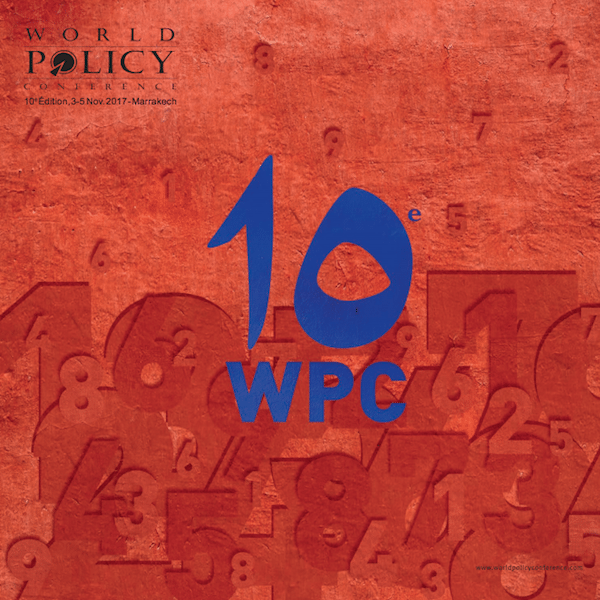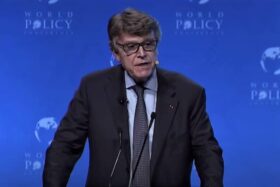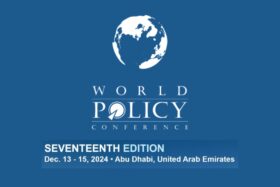The World Policy Conference (WPC) was founded with the profound conviction that when the ideology of liberal globalisation triumphed, in the wake of the Soviet Union’s collapse and the splintering of the Russian Empire, it did not usher in the end of History or the advent of universal peace and prosperity. According to that ideology, the Western-style democracy would expand across the entire planet, with borders and States fading as the oligopoly of global corporations, evidently convinced they were the chosen ones to exercise their social responsibility in service of the common good. International terrorism, which remains highly intertwined with the date “9/11”, was seen as an aberration in a course that could be corrected with a few neatly-chosen military interventions. In 2003, the US neo-conservative leaders decided that overthrowing Saddam Hussein’s regime would settle the problem in the Middle East. His regime was incidentally not their only target.
The WPC’s standpoint has always been different. In our view, States remain essential units in the international system and nations cannot be dissolved in some form of broader whole, because every culture is unique. Religions continue to play a prominent part, for fundamental anthropological reasons, but also as major ethnological, sociological and political markers, even when the players manipulating them, using the most barbaric methods, are eradicated. Our world’s governance institutions can and must be improved and supplemented; however, we do not believe in peace by law alone, for the most elaborate institutions reflect ever-shifting balances of power. Moreover, the very parties that identify global governance and international law have no qualms about transgressing them on occasion. On a human scale, in the medium term, good global governance should be aimed at maintaining a reasonably open world, which implies relations between nations that are both more equitable and more respectable of their diversity. It must, in particular, take into serious consideration the interests of the Southern nations and become proficient in co-managing issues as complex as climate change and the environment, or migration. All of this will require a great deal of time, for technical, cultural and political reasons.
The organisers of the WPC have no interest in pompous showiness. They are aware of the importance of what might be called the technology of governance, but they primarily put emphasis on constructive dialogue about geopolitical, geo-economic, cultural as well as technological issues. Indeed, the institutional frameworks that are most appealing on paper are doomed to fail if they are not based on a vision shared by all players. It is the search for that vision we are interested in above all.
The world’s history between 2008 and 2017 – which coincides with the WPC’s first decade – has greatly demonstrated this theory, long-known to advocates of the European integration.
More recently, global governance has been put to a harsh test with the arrival of President Trump, the misdeeds of international terrorism, the successive waves of refugees, the challenge of illiberal democracy, the move of some nations to assert narrowly-imagined national interests – at the risk of triggering conflict –, the nuclear crisis in the Korean peninsula, a resumption of the arms race, the general problem of inequalities across the world and the responses they stir, the war in Syria which stretches on, the confrontations in multiple forms between Iran and Saudi Arabia, not to mention potential economic and financial instabilities, despite a relatively satisfactory global economic outlook for the immediate future, and the list goes on. The world technology ideologists promised us may be bright, or in any case beneficial in many ways. However, for the time being, it is on a crash course with the world we inherited from the 20th century.
Fortunately, the worst is never guaranteed to come. While we must, in musing on the future, always keep in mind the possibility of negative “black swans”, we must also never forget that black swans can also be positive. In early 2017, many observers, including the most believable, thought the European Union to be on its deathbed. Today, after a series of unlikely turns of events, the landscape looks much more reassuring. Likewise, a certain easing of tension has settled in over the Korean peninsula, when the worst was to be feared at one point. The most important factor is that, unlike in 1914, for instance, none of the world’s major powers wishes to head into war. At its own level, the WPC aspires to create the most amenable conditions for the positive black swans.
In its first decade of existence, the WPC came together three times in Marrakesh, and it is in Morocco that it celebrated its 10th edition. This is a country that belongs to the African continent and plays an active role here, all the while clearly asserting itself in all four directions, north-south and east-west. The WPC’s presence in Morocco serves as a reminder that the geopolitics of peace should no longer be shaped within frameworks resulting directly from the Cold War, of which so many remain. The setting remains important: of this, I have long been convinced, as I have attended all the main international clubs and fora. And the generally recognised success of the WPC in its first years is also owed to Morocco, which understood our intent and, in hosting us, embraced it as its own.
Introduction to the program of the conference
The World Policy Conference (WPC) is back to Marrakesh for its 10th meeting. The first decade is a crucial milestone in any institution’s development, especially in today’s world, when the pace of change is accelerating.
The WPC has its roots in a reaction to the globalist ideology which dominated the earliest years of the 21st century. I like to sum it up as a kind of chemical equation: it was the idea that combining democracy and market economy would lead to peace and prosperity. In accordance with that ideology, authoritarian and dictatorial regimes were overthrown. The outcome was chaos. Attempts to erase borders and differences between peoples fuelled nationalism and populism. Instead of peace, deadly, destructive and barbaric conflicts broke out. Refugee and migrant flows have increased. International terrorism has thrived. Worldwide arms sales are back to Cold War levels. Defence budgets are rising everywhere. The trend is toward rebuilding borders, repatriating economic activities and curtailing movements of people and capital. Instead of evenly spreading prosperity, the recklessness of international finance nearly caused a meltdown comparable to the depression of the 1930s. Today’s world is marked by inequality and unemployment which appear everywhere, although in various guises. Even in places where there is no war, an undertone of violence can be sensed. The ideological pendulum may now be swinging in the opposite direction from that of the century’s early years.
The WPC takes a realistic but humanistic and constructive view of changes taking place in the international system, which is heterogeneous, global, multipolar and complex. The heterogeneity comes first of all from cultures or ideologies and the political regimes they have spawned. For the world to remain reasonably open, states must cultivate cooperative solutions between themselves and hold back from interfering in the internal affairs of others as much as possible. The world will tendentially stay open as a necessary consequence of the development of science and technology. Tomorrow’s world will not be built with walls and barbed wire. The goal is to continue learning to manage interdependence better in the short, medium, long and even very long term (climate and the environment are the first examples that come to mind). Multipolarity means nothing more than this: geography and history have made some states more capable than others to shape their environments, near or far. Good governance requires them to think of their national interests in broad terms, and therefore within the framework of international law. That is not a natural attitude for the great powers, which means that even more responsibility rests on the middle powers’ shoulders. The closer the ties between them, the more influential they may become. Lastly, complexity shows in the multiplication of “Butterfly Effects” in the economic and financial order (the subprime crisis and its aftermath) as well as in the political realm (the so-called “Arab Spring”).
The WPC continuously aims to contribute, both in terms of principles and methods, to a useful and therefore constructive reflection on a more pragmatic and flexible global governance. To that end, we must first open up to every continent, especially Africa, whose future will impact that of the planet as a whole. The Kingdom of Morocco, hosting us so generously and elegantly for the third time, is open to the four cardinal points and I believe it shares the WPC’s vision. Its return to the African Union has great geopolitical significance.
I am deeply grateful to Morocco, as well as to all those who have been aspiring to the same common goal for ten years, which is to enable the human genius to keep producing the most promising ideas for humanity as a whole through the diversity of cultures and civilisations.
Listen to the speech of the opening session and envoi, as well as an interview.




